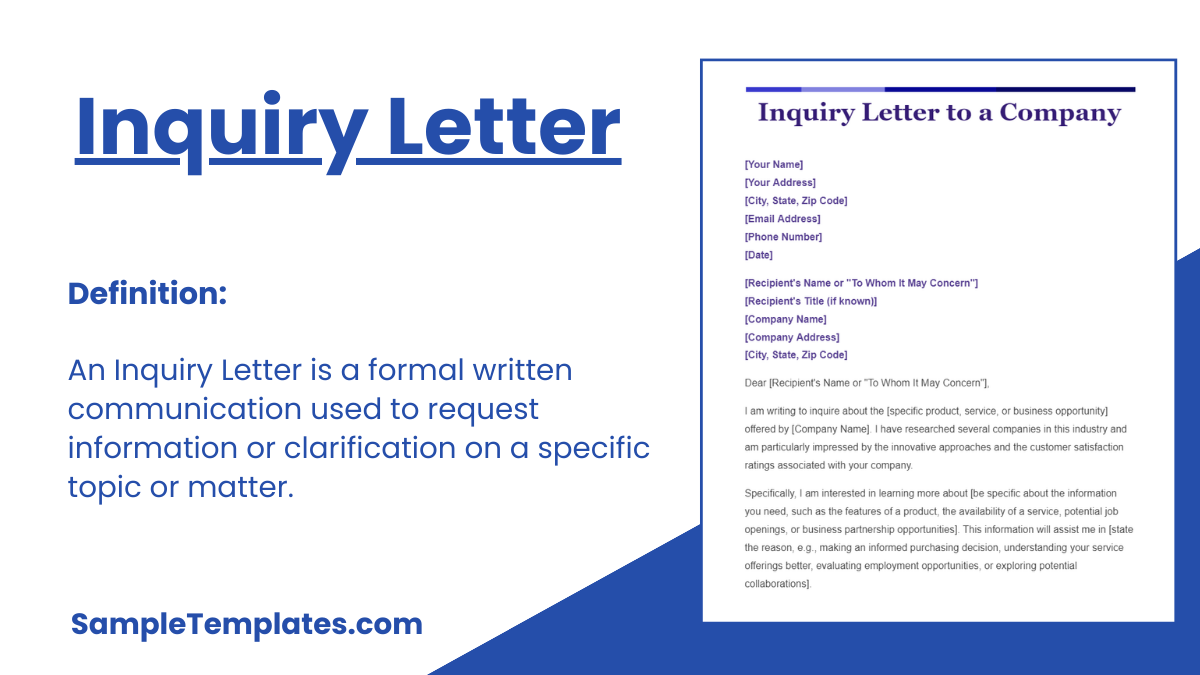A letter of inquiry is integral in securing many things such as money for a project from a foundation or an organization. The letter of inquiry can be found to gauge whether interests align with regard to the foundation and the project one undertakes. Moreover, a well-written query letter is integral in establishing long lasting relationships between two organizations or an individual, thus it can be corporate or personal in nature. These templates offer a great way to efficiently come up with an excellent letter of inquiry Definition. They can be availed for free on the internet. If successful, a Sponsorship Proposal Letter is usually sent in response.
The Many Features of A Letter of Request:
– A letter of query has as its major function the task of securing funding for some activity of the sender. Thus it must detail the sender’s intention of what he or she intends to do with the aforementioned funding. Basically it must clearly define the work into which the receiver of the sample letter is being asked to invest.
– A letter of inquiry must be worded in such a manner so as to keep the tone as polite and respectful as possible. It is after all a proposition for funds. These, unlike a financial aid appeal letter, do not request funds outright, but first prove the worth of the project before asking for monetary help.
– The letter also needs to be structured in such a manner so as to avoid any ambiguous phrasing. Organizations that are likely to provide funding are very careful when it comes to providing monetary aid and will not accept a letter explaining a project they cannot fully comprehend.
Why The Templates are Ideal for Such Letters:
– The main body of the letter is written by an expert. This is a general address that states in general terms an ambiguous project in a Professional Resume manner. The wording is clear and succinct.
– Thus, it can and should be edited to suit the needs of the sender with more specific information pertaining to their project. There are various samples the sender can edit before coming up with a viable letter format.
– Being available digitally, they can be stored in several file formats like Word and Excel.
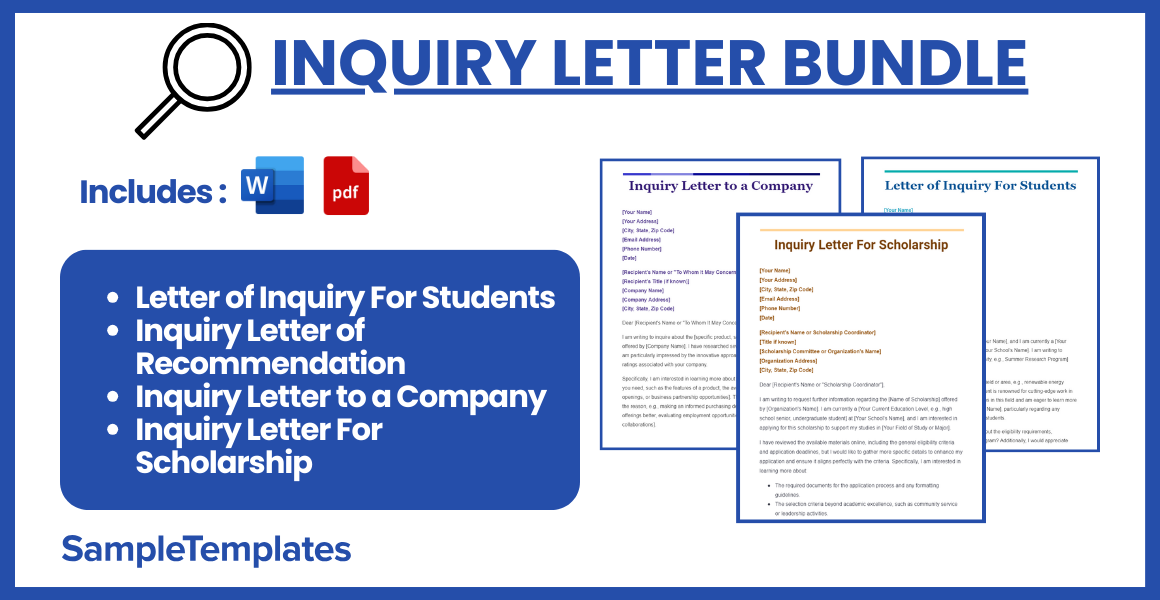
Download Inquiry Letter Bundle
Letter of Inquiry For Students
[Your Name]
[Your Address]
[City, State, Zip Code]
[Email Address]
[Phone Number]
[Date]
[Recipient’s Name]
[Recipient’s Title]
[Department]
[University Name]
[University Address]
[City, State, Zip Code]
Dear [Recipient’s Name],
I hope this letter finds you well. My name is [Your Name], and I am currently a [Your Year, e.g., junior] majoring in [Your Major] at [Your School’s Name]. I am writing to inquire about the [specific program or opportunity, e.g., Summer Research Program] offered by [University’s Department Name].
I have a keen interest in [mention the specific field or area, e.g., renewable energy research], and I understand that your department is renowned for cutting-edge work in this area. I am considering furthering my studies in this field and am eager to learn more about the opportunities available at [University Name], particularly regarding any upcoming projects that involve undergraduate students.
Could you please provide more information about the eligibility requirements, application process, and deadlines for this program? Additionally, I would appreciate details regarding potential mentors and the areas of research they are currently focusing on.
Understanding these aspects will greatly assist me in planning my application and future academic endeavors. I am particularly interested in how I could contribute to and learn from the ongoing research at your esteemed department.
Thank you very much for considering my request. I look forward to your reply.
Warm regards,
[Your Name]
[Your Signature (if sending a hard copy)]
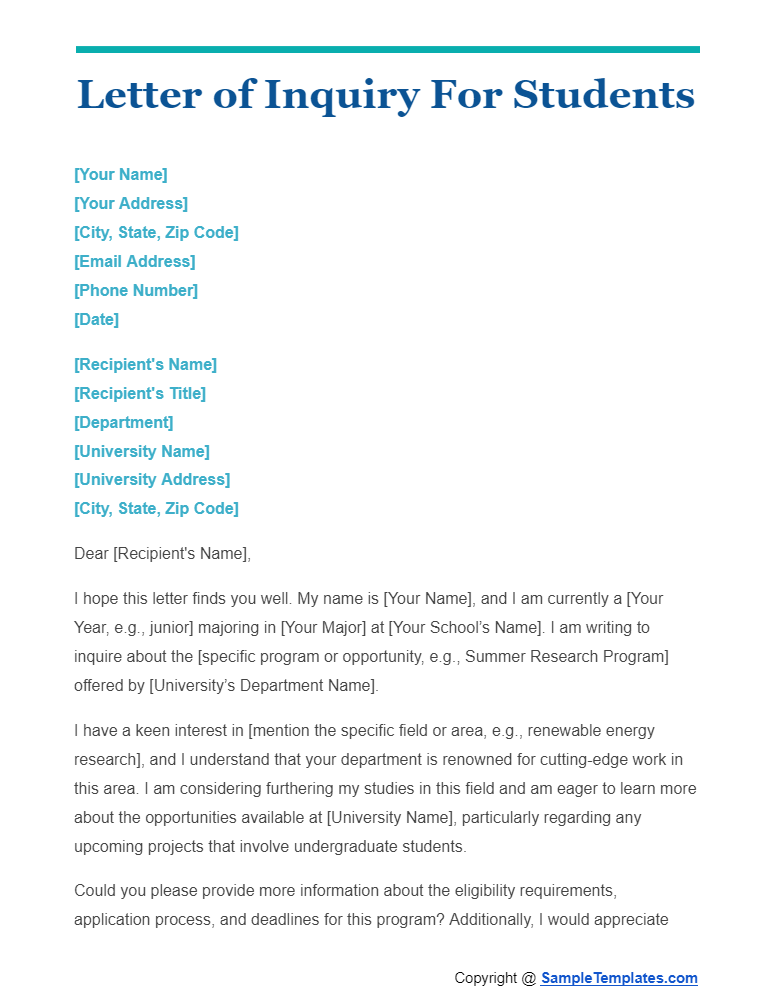
Inquiry Letter of Recommendation
[Your Name]
[Your Address]
[City, State, Zip Code]
[Email Address]
[Phone Number]
[Date]
[Recommender’s Name]
[Recommender’s Title]
[Department or Company]
[Institution or Company’s Name]
[Institution or Company’s Address]
[City, State, Zip Code]
Dear [Recommender’s Name],
I hope this message finds you well. I am [Your Name], and I had the pleasure of being in your [specific class or job position, e.g., Advanced Chemistry class] during [time period, e.g., the fall semester of 2021] at [Institution’s Name]. I greatly appreciated your expertise in [mention specific subject or skill, e.g., organic chemistry] and the mentorship you provided during my coursework, which has significantly contributed to my academic growth.
As I am currently preparing my application for [mention the program, job, or opportunity you are applying for, e.g., a master’s program in Chemical Engineering], I am reaching out to inquire if you would be willing to write a letter of recommendation on my behalf. Your perspective on my skills and experiences would be invaluable as it would provide the [admission committee, hiring manager, etc.] with a comprehensive view of my capabilities and dedication.
I understand that this is a significant request, and I would be more than happy to provide any additional information or materials, such as my resume, transcripts, or a draft of the letter to facilitate the process. I would also be glad to discuss this further at a time that is convenient for you, whether over the phone or in person.
Thank you very much for considering my request. Your support is crucial to my pursuit of further education and professional development, and I would deeply appreciate your assistance.
Looking forward to your positive response.
Warm regards,
[Your Name]
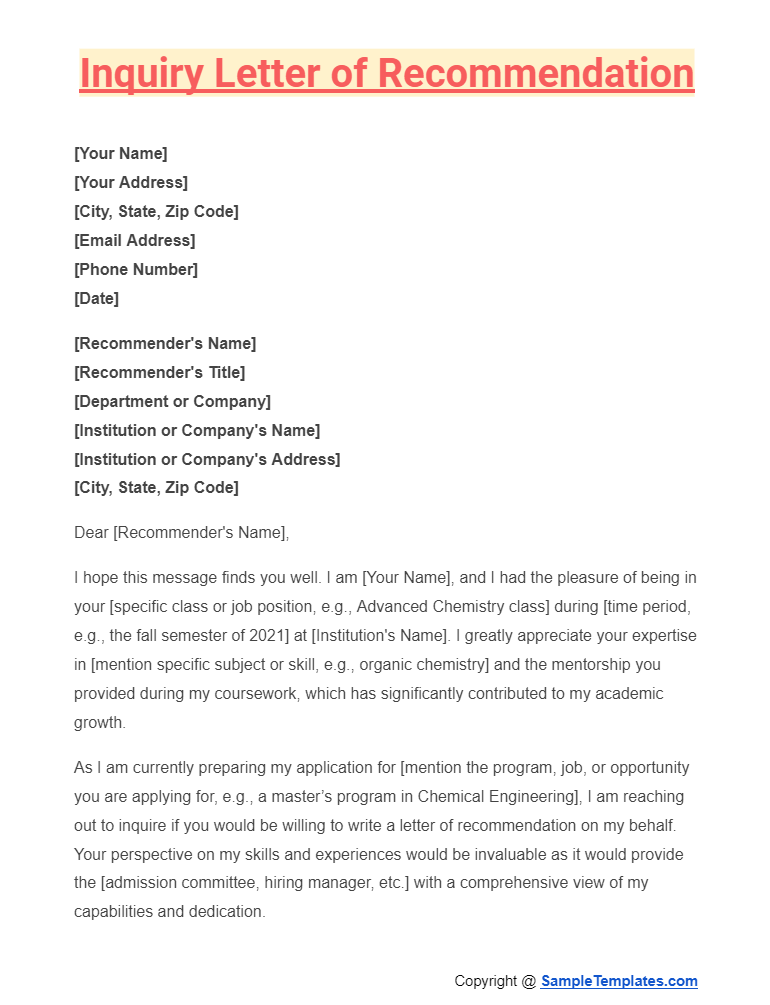
Inquiry Letter to a Company
[Your Name]
[Your Address]
[City, State, Zip Code]
[Email Address]
[Phone Number]
[Date]
[Recipient’s Name or “To Whom It May Concern”]
[Recipient’s Title (if known)]
[Company Name]
[Company Address]
[City, State, Zip Code]
Dear [Recipient’s Name or “To Whom It May Concern”],
I am writing to inquire about the [specific product, service, or business opportunity] offered by [Company Name]. I have researched several companies in this industry and am particularly impressed by the innovative approaches and the customer satisfaction ratings associated with your company.
Specifically, I am interested in learning more about [be specific about the information you need, such as the features of a product, the availability of a service, potential job openings, or business partnership opportunities]. This information will assist me in [state the reason, e.g., making an informed purchasing decision, understanding your service offerings better, evaluating employment opportunities, or exploring potential collaborations].
Could you please provide detailed information on [insert specific questions or requirements here]? Additionally, if there are brochures, catalogs, or other informational materials that could help me better understand your offerings, I would appreciate receiving them.
I am looking forward to your prompt response as I am eager to finalize my decisions/plan my next steps as soon as possible. Please feel free to contact me via email at [Your Email Address] or by phone at [Your Phone Number].
Thank you for considering my inquiry. I am hopeful that there is potential for a beneficial relationship between us, and I am eager to explore the options that your company provides.
Sincerely,
[Your Name]
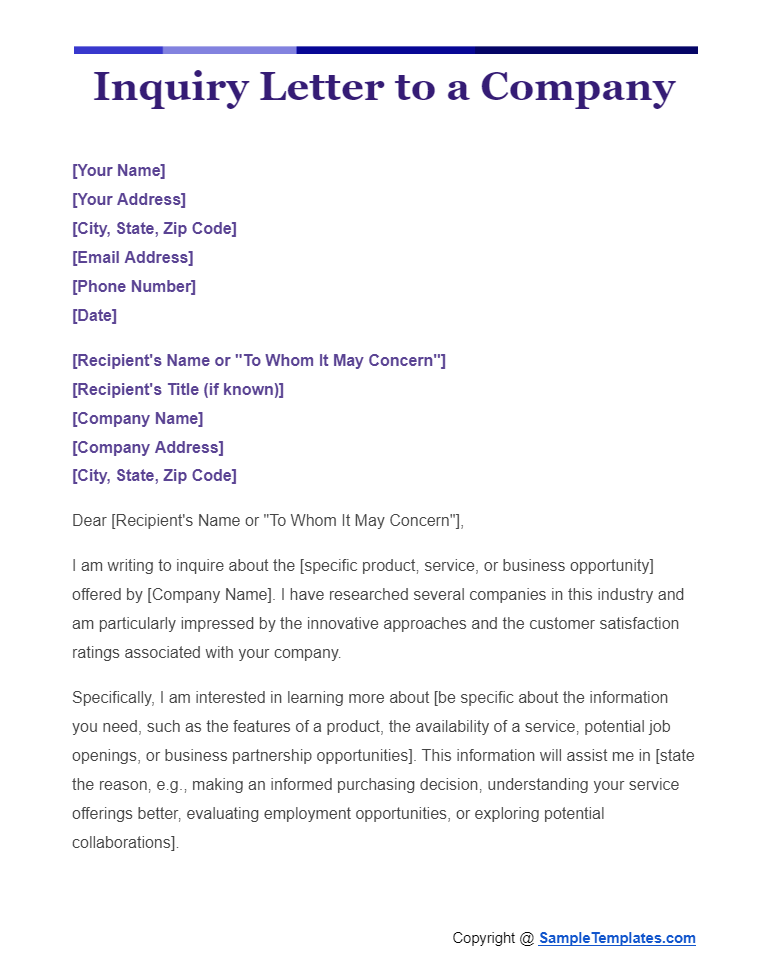
Inquiry Letter For Scholarship
[Your Name]
[Your Address]
[City, State, Zip Code]
[Email Address]
[Phone Number]
[Date]
[Recipient’s Name or Scholarship Coordinator]
[Title if known]
[Scholarship Committee or Organization’s Name]
[Organization Address]
[City, State, Zip Code]
Dear [Recipient’s Name or “Scholarship Coordinator”],
I am writing to request further information regarding the [Name of Scholarship] offered by [Organization’s Name]. I am currently a [Your Current Education Level, e.g., high school senior, undergraduate student] at [Your School’s Name], and I am interested in applying for this scholarship to support my studies in [Your Field of Study or Major].
I have reviewed the available materials online, including the general eligibility criteria and application deadlines, but I would like to gather more specific details to enhance my application and ensure it aligns perfectly with the criteria. Specifically, I am interested in learning more about:
- The required documents for the application process and any formatting guidelines.
- The selection criteria beyond academic excellence, such as community service or leadership activities.
- Any specific expectations regarding the personal statement, including themes or questions to be addressed.
- The timeline for the application review process and when decisions will be communicated.
I am very eager to apply for the [Name of Scholarship] as I believe my goals and values closely align with the mission of [Organization’s Name]. My [mention any relevant achievements, experiences, or personal qualities briefly] make me a strong candidate for this opportunity.
Please let me know if there are additional application guidelines or upcoming information sessions that could further assist prospective applicants. You can reach me via email at [Your Email Address] or by phone at [Your Phone Number]. I am looking forward to your response and hope to contribute to [relevant contribution to the organization or field].
Thank you for your time and consideration.
Sincerely,
[Your Name]
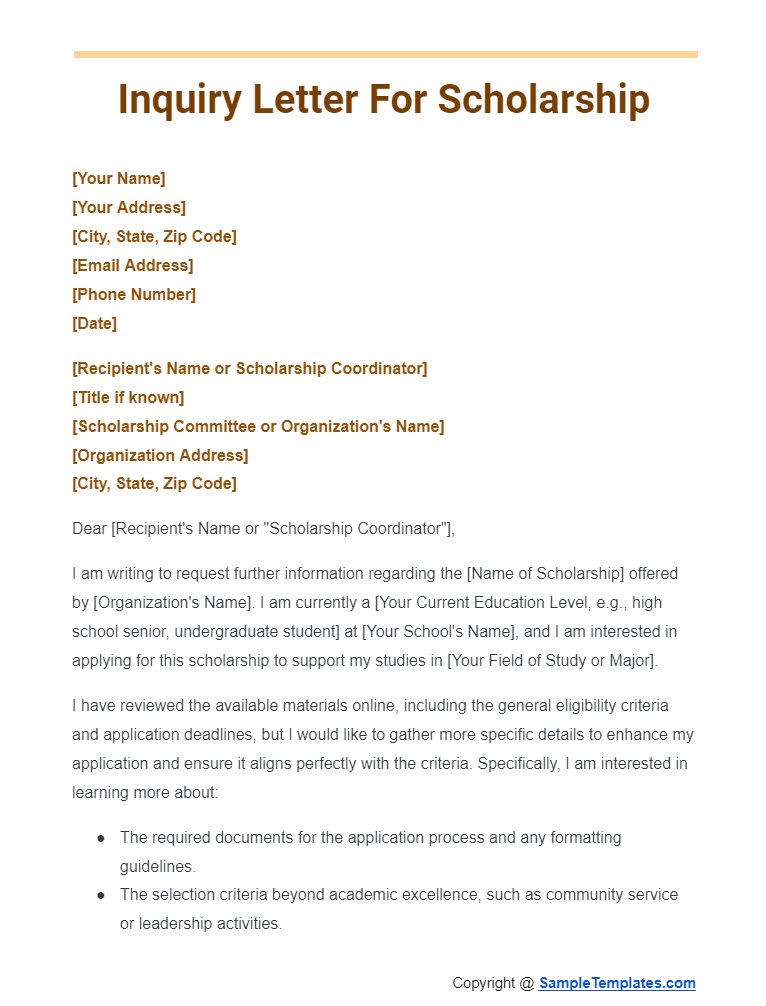
Browse More Templates On Inquiry Letter
Business Inquiry Letter Template
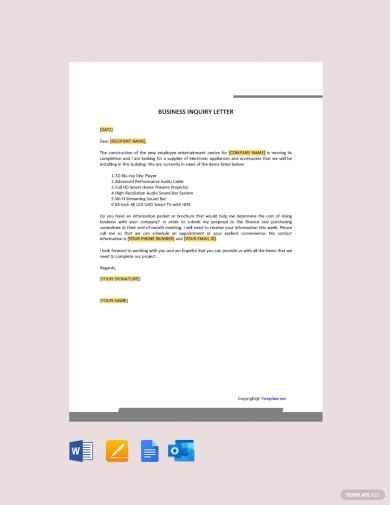
Formal Business Inquiry Letter Template
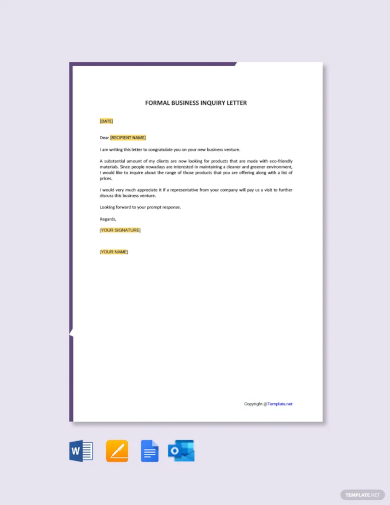
How To Write a Letter of Inquiry?
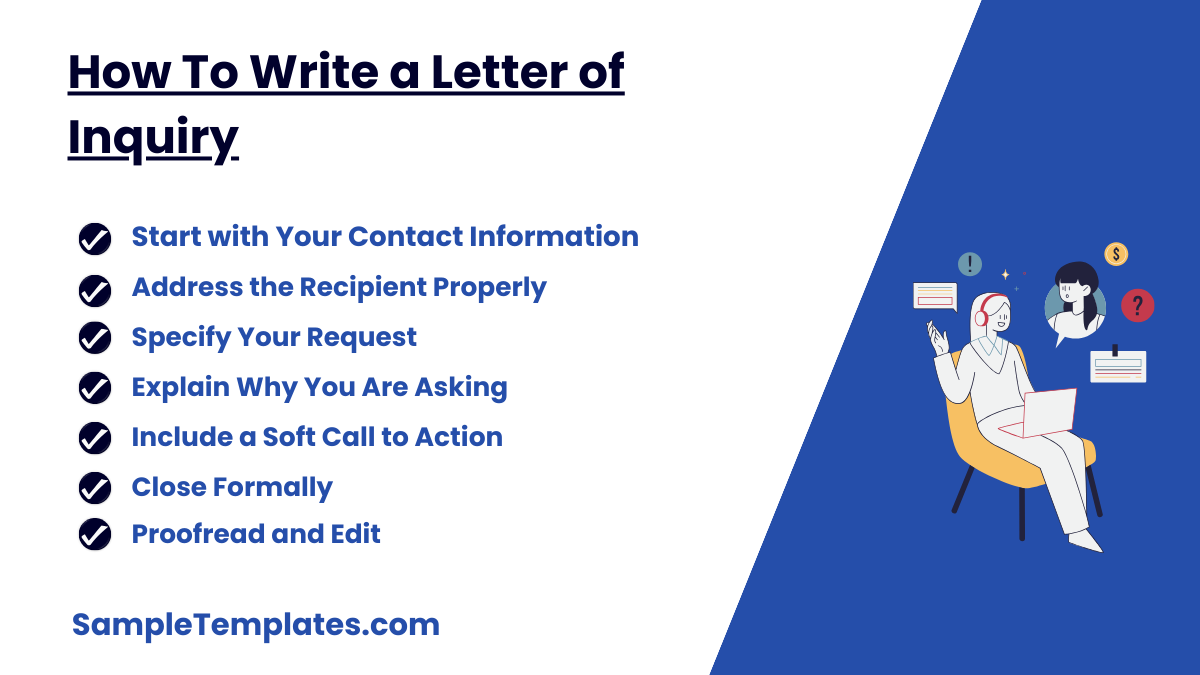
Writing a letter of inquiry involves clearly stating your purpose, asking specific questions, and being concise. This type of letter is commonly used to request information about products, services, job openings, or academic programs. Here is a step-by-step guide on how to write an effective letter of inquiry:
1. Start with Your Contact Information
Include your name, address, phone number, and email address at the top of the letter, followed by the date. This should be followed by the recipient’s name and address. If you don’t know the specific contact person, a general title like “Hiring Manager” or “Admissions Office” can be used.
2. Address the Recipient Properly
Use a formal salutation such as “Dear Mr./Ms. [Last Name],” or if the specific name is unknown, “Dear Hiring Manager,” or “To Whom It May Concern,”.
3. Introduce Yourself and State the Purpose
Begin your simple letter by briefly introducing yourself. Mention your current role or professional standing, and directly state the purpose of your inquiry. Be clear and concise about what information or details you are seeking.
4. Specify Your Request
Detail the specific information you are requesting. Be precise about what you need to know. This might include questions about a job opening, details about a product, or information about admission deadlines, scholarships, or courses offered by an educational institution.
5. Explain Why You Are Asking
Mention why this information is important to you. Link it to your professional or academic aspirations if relevant. This helps the recipient understand the context of your inquiry and can make them more responsive to your request.
6. Include a Soft Call to Action
Encourage the recipient to respond or provide the requested information. A polite prompt such as, “I would greatly appreciate your assistance in helping me gather this information,” or “I look forward to your timely response,” can be effective.
7. Close Formally
End your letter with a formal closing such as “Sincerely,” followed by your name. If you are sending a printed letter, leave space for your signature above your typed name.
8. Proofread and Edit
Ensure your letter is clear, professional, and free of any spelling or grammatical errors. A well-written letter reflects your professionalism and seriousness about the inquiry.
Free Business Inquiry Letter Example Template
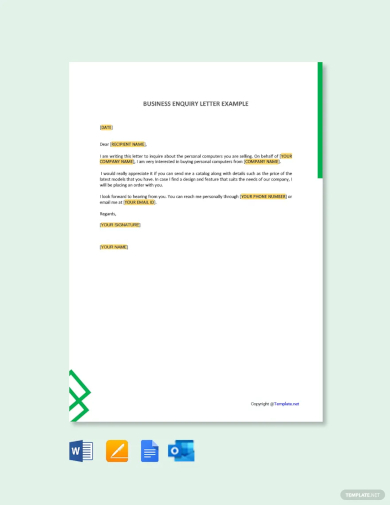
Free Letter Bankruptcy Inquiry Template
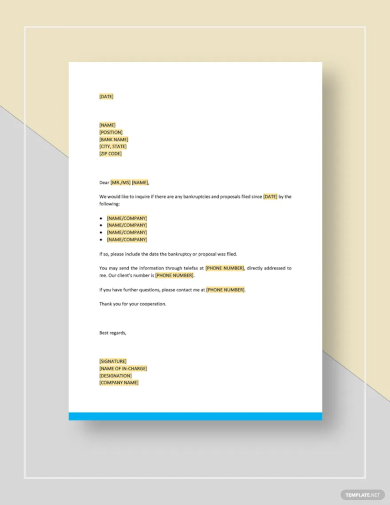
Response Letter Sample to an Inquiry Template
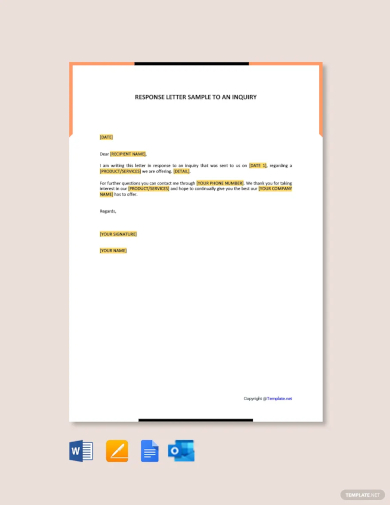
Letter of Inquiry Job Template
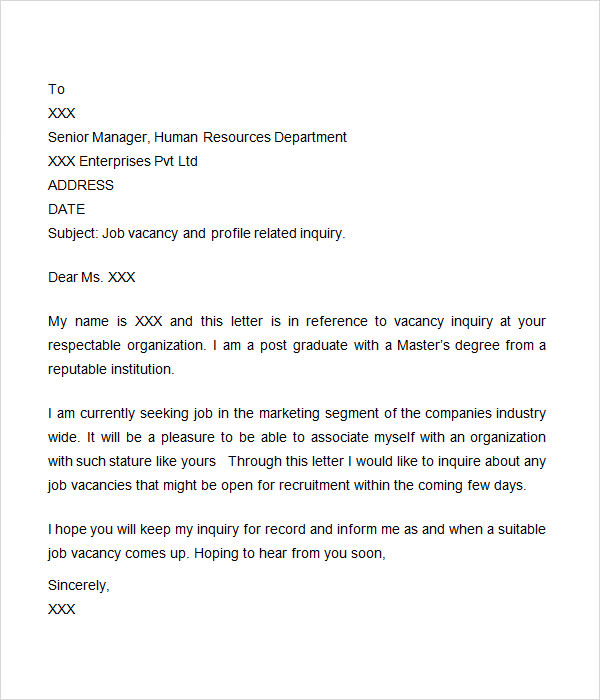
Letter of Inquiry Examples
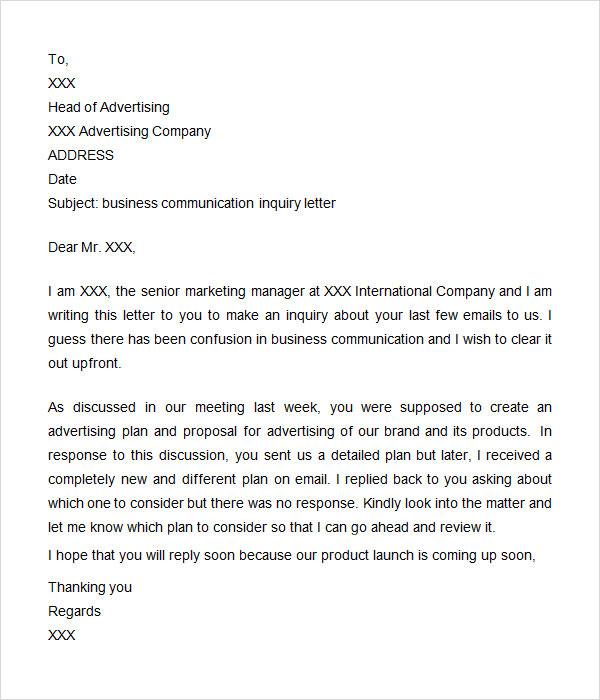
Sample Letter of Inquiry Template
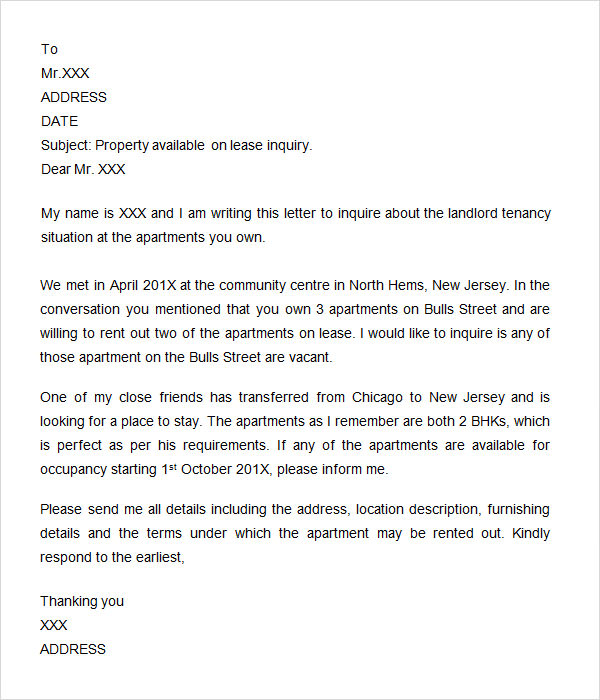
Tips For Writing a Inquiry Letter
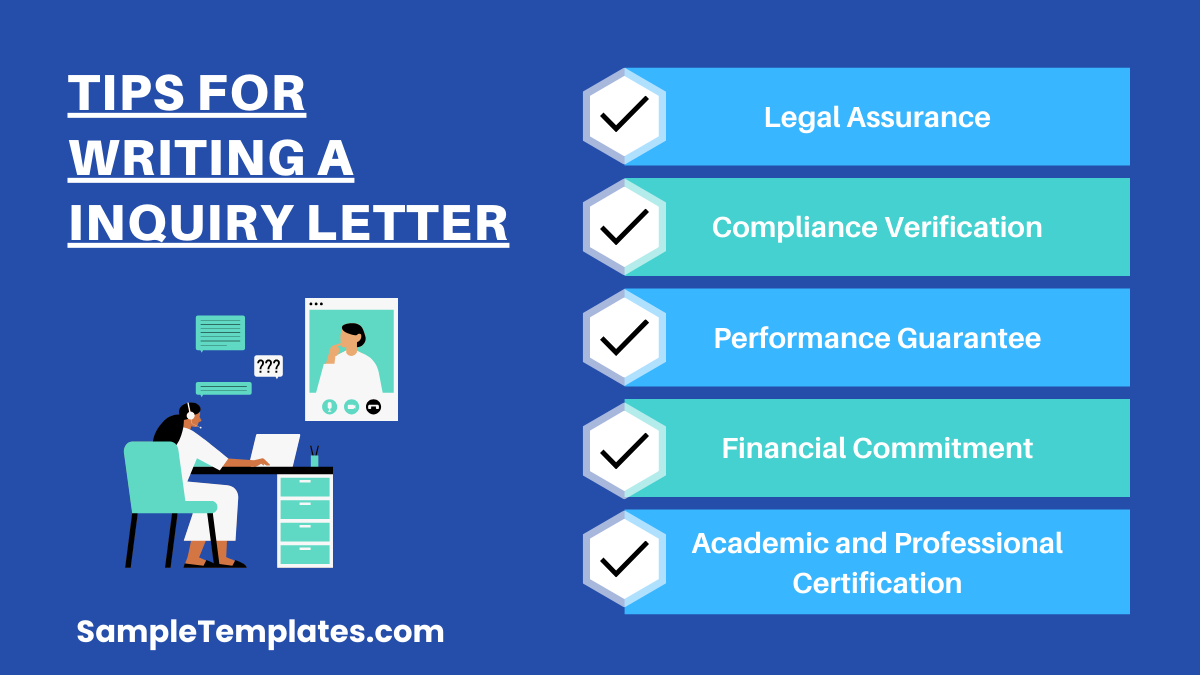
Writing an effective inquiry letter is crucial when you’re seeking information or clarification. Here are some practical tips to help you craft a clear and professional inquiry letter:
- Be Clear and Concise: Your letter should be straightforward and to the point. Clearly state your purpose for writing at the beginning, and keep your language simple and direct throughout.
- Be Specific: Instead of vague requests, specify exactly what information or details you need. This helps the recipient understand your request more clearly and respond more effectively.
- Keep It Short: An inquiry letter should be brief. Aim for no more than one page. This helps maintain the reader’s attention and ensures that your request is seen as reasonable and not overly demanding.
- Start with a Proper Introduction: Open your sample letter with a brief introduction of yourself or your organization if it’s not a personal letter. If you have a connection or referral, mention it early in the letter to establish credibility.
- Organize Your Content: Structure your letter logically. After your introduction and statement of purpose, list your questions or information needed in a clear format, possibly with bullet points or numbered lists.
- Use a Polite and Respectful Tone: Even if you are frustrated by a lack of previous response or by other issues, keep your tone polite and professional. Courtesy in your letter can encourage a positive response.
- Include a Thank You: Express appreciation for the recipient’s time and consideration in responding to your inquiry. This acknowledges their effort and sets a cooperative tone.
- Close with a Clear Call to Action: End your letter by specifying what you hope the recipient will do and suggest how they can contact you. For example, you might ask for a reply by a specific date or offer to discuss the matter over the phone.
- Provide Your Contact Information: Make sure your contact information is easy to find, either at the top of the letter under your name or at the bottom after your signature.
- Proofread: Before sending your letter, proofread it thoroughly to correct any spelling, grammar, or punctuation errors. A clean, error-free letter presents a professional image.
By following these tips, your inquiry letter will effectively communicate your requests and increase the likelihood of receiving the detailed and specific information you need.
Formal Letter Inquiry Template
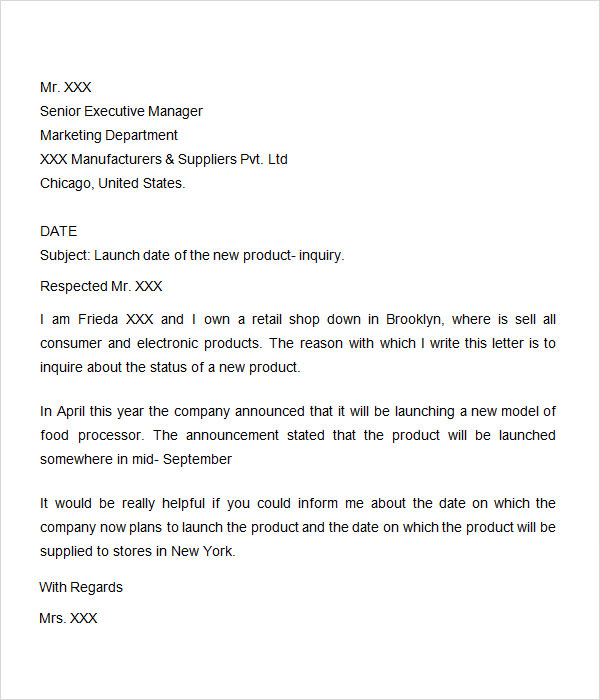
Letter of Inquiry Internship Template
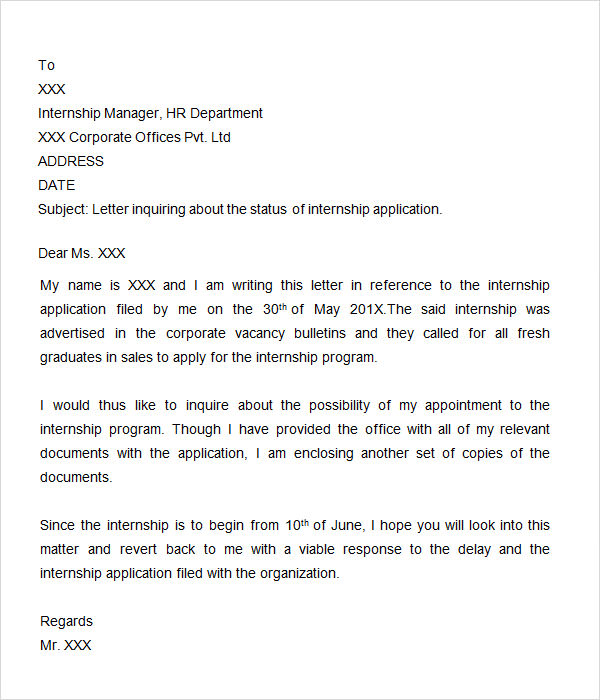
Letter of Inquiry Grant Template
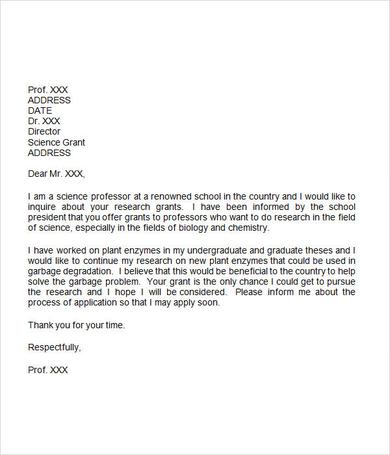
Letter of Inquiry Template
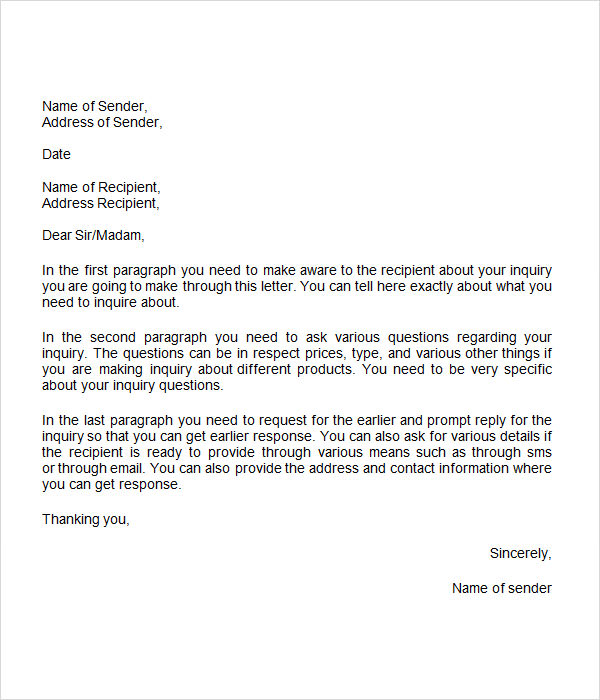
Importance of Inquiry Letter
An inquiry letter is a valuable tool in both professional and personal contexts, and its importance can be highlighted across several dimensions:
- Initiates Communication: An inquiry letter serves as a formal way to initiate communication between two parties. It is particularly useful when reaching out to individuals or organizations with whom you have no previous contact.
- Gathers Information: The primary purpose of an inquiry letter is to request specific information or clarification on issues such as product details, job vacancies, application procedures, or company policies. This direct approach is often more efficient than searching through general sources.
- Facilitates Decision Making: By obtaining necessary information, an inquiry letter helps in making informed decisions. Whether it’s deciding on a purchase, applying for a job, choosing an educational program, or starting a business partnership, having the right information is crucial.
- Builds Professional Relationships: Sending a well-crafted inquiry letter can set the foundation for a professional relationship. It shows initiative and interest and can open doors to future collaborations and opportunities.
- Demonstrates Professionalism and Seriousness: Crafting a formal inquiry shows that you are serious about your interest or need. This level of professionalism is often appreciated by recipients and can influence the quality and speed of their response.
- Saves Time and Resources: An inquiry letter allows you to directly ask for exactly what you need, saving time and resources that might otherwise be spent on sorting through irrelevant information.
- Enhances Credibility: When you articulate your queries clearly and professionally, it enhances your credibility. Recipients are more likely to view you as organized and competent, improving the likelihood of a positive engagement.
- Legal Documentation: In some contexts, an inquiry letter can serve as a piece of formal documentation that might be needed for legal or record-keeping purposes. It shows that you have actively sought out necessary information or clarification.
In summary, an inquiry letter is important because it proactively addresses your needs for specific information, helping you to proceed with confidence in your various endeavors. It is a fundamental skill in business communication, reflecting both professionalism and the capacity for effective interaction.
Rental Inquiry Letter Template
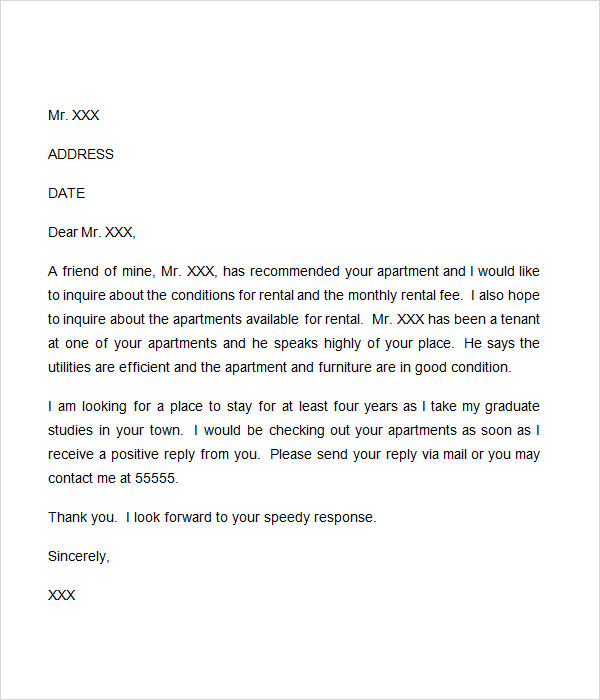
Inquiry Letter Format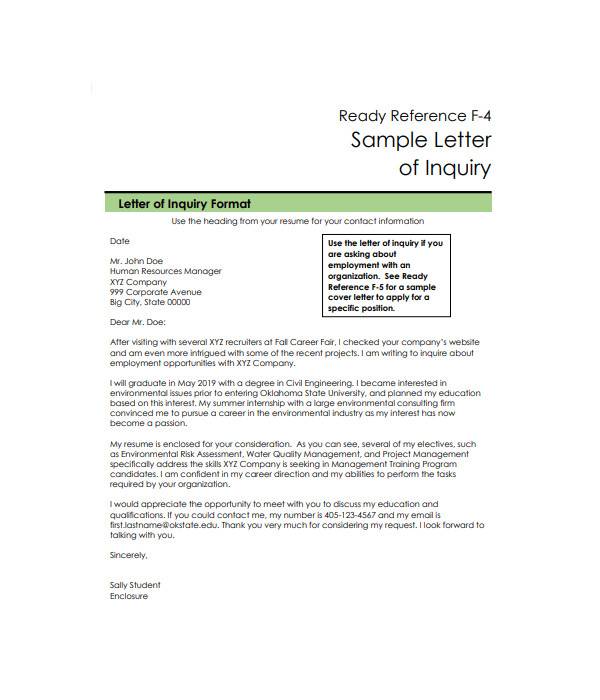

What is a letter of inquiry for a job?
A letter of inquiry for a job is a proactive letter sent to a company to explore potential job openings or express interest in working for the organization, even if no specific job is advertised.
How to begin a letter of enquiry?
Start a letter of enquiry with a polite greeting and a clear introduction of yourself, followed by a concise statement of the purpose of your letter, specifying what information you are seeking.
Is letter of inquiry a formal letter?
Yes, a letter of inquiry is a formal letter. It follows a professional tone and structure, using formal language to request information or clarification from an individual or organization.
What is the purpose of a request letter?
The purpose of a request letter is to formally ask an individual or organization for something specific. It can be information, permission, service, or any assistance related to business or administrative matters.
Does inquiry mean request?
Yes, in many contexts, an inquiry can mean a request. It often refers to seeking information or clarification about a particular subject, usually in a formal and structured manner.
In conclusion, an Inquiry Letter serves as a professional tool for seeking information or clarification on a particular matter. Its concise and courteous nature demonstrates respect for the recipient’s time and expertise, fostering effective communication and potentially leading to valuable insights or opportunities.
If you have any DMCA issues on this post, please contact us!
Related Posts
Resignation Letter for Medical Samples & Templates
Letter of Intent Samples & Templates
Letter of Intent for a Job Samples & Templates
Lease Proposal Letter Samples & Templates
Letter of Inquiry Samples & Templates
Character Reference Letter Samples & Templates
Claims Letter Samples & Templates
Response Letter Sample & Templates
Follow Up Letter Samples & Templates
Sample Project Proposal Letter Templates
Donation Letter Samples & Templates
Addressing a Formal Letter Samples & Templates
Grievance Letter Samples & Templates
Sample Sponsor Thank You Letter Templates
Sample Letters of Request
